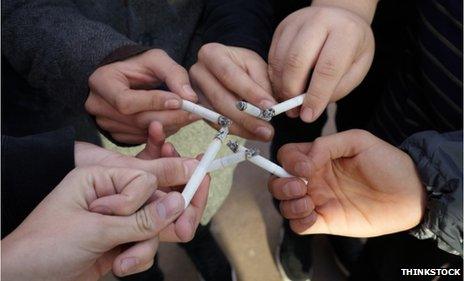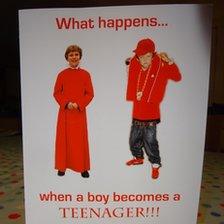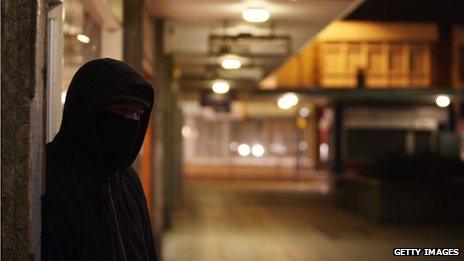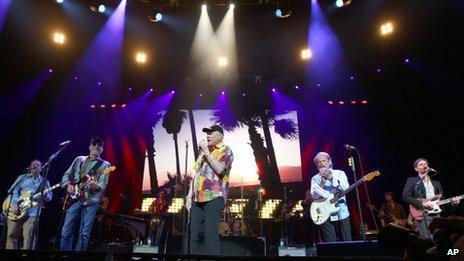Is the teen rebel a dying breed?
- Published
- comments

My son has just turned 13 and I made him a card to mark the moment he became a teenager. I put a picture of him as a choir-boy next to a Photoshopped shot of him as a saggy-trousered gangsta rapper - the innocent child mutating into a growling ball of rebellious fury. But a series of recent official statistics are making me question whether the old joke is true any more.
Teenage rebels are not what they were.
Adolescents are increasingly turning their noses up at drugs, booze and fags, with consumption by young people the lowest at almost any time since we started measuring these things.
Drugs: Last week, the Home Office published analysis, external which suggests the proportion of 16- to 24-year-olds that have ever taken illicit drugs has fallen from 54% in 1998 to 38% now. Among 11- to 15-year-olds the figure has fallen from 29% to 17% in a decade.
Tobacco: Last month, NHS analysis suggested, external the proportion of English 16- to 19-year-olds who have never smoked has risen from about two-thirds in 1998 to three-quarters now. And the data is just as striking among their younger brothers and sisters. In 1982 most 11- to 15-year-olds (53%) had had a sneaky cigarette at one time or another. Today, just a quarter has ever spluttered over a fag behind the bike sheds.

The card Mark made for his son
Alcohol: It is a similar story with booze, external. In 1998, 71% of 16- to 24-year-olds questioned said they'd had a drink that week. Today it is 48% - far lower than their parents (about 70%). Among 11- to 15-year-olds there are similar big falls. A decade ago, 26% reported they'd had alcohol in the previous week. Now the data suggests the figure is 13%.
So what is going on? When it comes to smoking and drinking and taking drugs, British teenagers are behaving better than their parents.
That's not to say there are not still real challenges, of course. But the trends are encouraging enough to question whether the archetypal teen is evolving.
The concept of adolescence goes back to the 1900s and the American psychologist G Stanley Hall, who argued that the biological changes associated with puberty drove problematic behaviour. He described it as a period of "storm and stress" when young people demanded freedom but needed discipline.
The theory was embraced in 1950s Britain, where the establishment had become seriously concerned about the threat from rebellious youth. Along with exotic clothes and loud music, a new word had crossed the Atlantic - teenager. It was a term that inspired the development of a new economically independent sub-culture, simultaneously exciting and terrifying.
Over the next four decades, teddy boys, bikers, mods, rockers, hippies, punks, ravers and grungers put two pubescent fingers up at authority in their own fashion and took delight in watching the staid grown-ups flinch and frown.
Today, though, where are the rebellious sub-cultures?
No-one is suggesting that young people don't misbehave, but teenagers no longer seem to define themselves by wild disobedience. If anything, we are in the middle of a period of increasingly good behaviour.

A simple measure of "juvenile delinquency" is the number of youngsters who enter the criminal justice system as a result of a police reprimand or conviction. The figure for England and Wales has halved in 10 years - from about 90,000 in 2001 to 45,000 young people in 2011.
There are going to do be many factors that contribute to this trend. Those people working in schools and youth services will argue that their work on smoking, alcohol and drugs is the reason all the arrows are pointing the right way.
The police, probation and social services may claim that they have been responsible for improvements in behaviour.
But I wonder if there is something else going on here. Could it be that teenage rebellion needs to look different to what your mum and dad did? Smoking, boozing, dropping pills and hooliganism - that's so Generation X.
These days, perhaps, adolescent identity is defined more by the use of social media rather than the use of illicit drugs. It might be that texting and messaging, Facebook and Bebo provide the exclusive amity once provided by gangs and musical sub-cultures.
In my day, the classic bored teenager hung around the bus-stop with a few mates and someone produced a packet of 10 and a bottle of cider. Nowadays they are upstairs on the laptop, PS3 or mobile, gossiping and playing and flirting. It is a digital world where grown-ups are not allowed, a playground for the virtual teen rebel.

Over the weekend I went to see the Beach Boys perform at Wembley Arena. I don't know whether it made me feel very old or very young. The original teenage boy band put on a good show, but there was something disconcerting about the line-up of pensioners, some of whom bore witness to a misspent youth.
The age profile of the audience was far more mixed than I had expected. There were thousands of teenagers among the baby-boomers. What was going through their minds as they looked at Brian Wilson trying to focus and Mike Love dad-dancing?
I wonder whether the word "teenager" is being redefined and the card I sent my son for his 13th birthday is an example of a prejudice that has had its day.